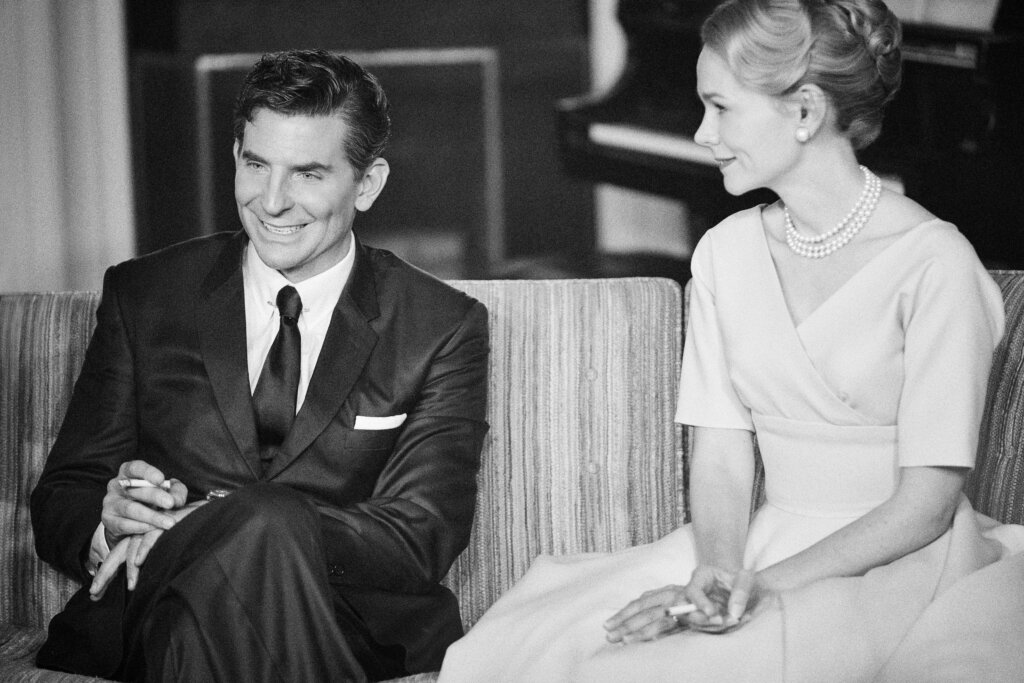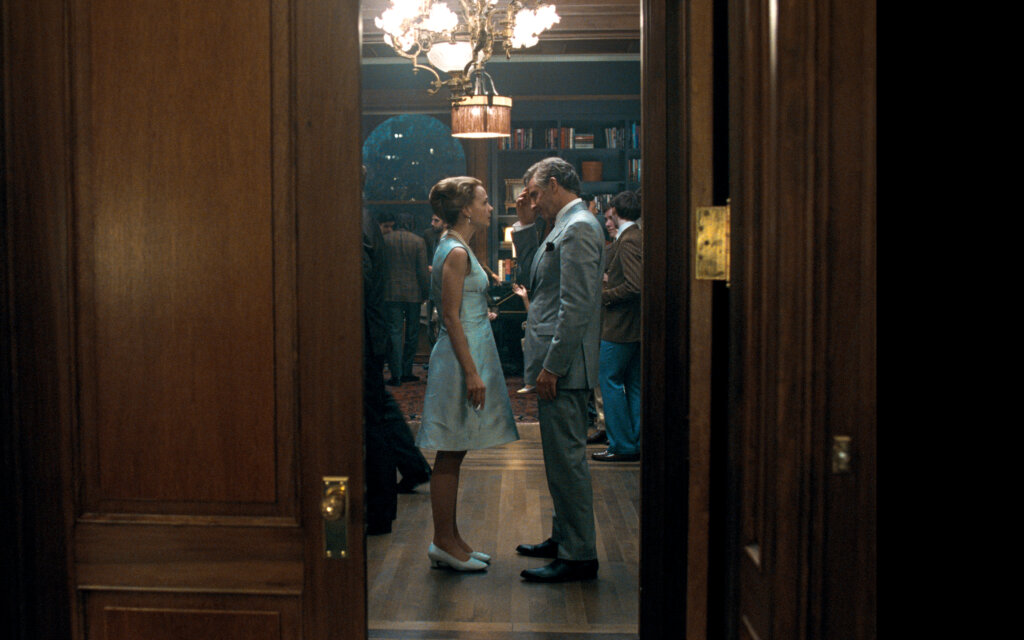Leonard Bernstein was a big deal. Why does ‘Maestro’ make him so small?
Four critics discuss what Bradley Cooper’s biopic leaves out

Bradley Cooper conducts in character as Leonard Bernstein in Maestro. Photo by Jason McDonald/Netflix
Capturing the life of Leonard Bernstein, whose fame and genius spanned so many fields, is an unenviable, and perhaps impossible, task.
For decades he was at the podium for the New York Philharmonic, in between his second, third and fourth careers as a composer, educator and public intellectual. The new film Maestro is not a holistic portrait of Bernstein, but a profile of his marriage with the actor and activist Felicia Montealagre, and the many ways Bernstein’s selfishness took its toll on their relationship.
Starring Bradley Cooper, who also directed and co-wrote the screenplay with Josh Singer, the film was made with the blessing of Bernstein’s three children, who opted for Cooper’s narrowly focused account over a rival film with Jake Gylenhaal attached. The finished film, which co-stars Carey Mulligan as Montealagre Bernstein, is a lush snapshot of a man whose great love of people — many of them men — made monogamy impossible and often blinded him to his troubles at home.
Four Forward culture writers attended a screening at the Angelika Film Center, where Bernstein’s gorgeous music was interrupted by the rattle of the nearby subway. What follows is an edited version of our conversation, addressing the life of a Jewish American legend and where the film succeeded and fell short of capturing what made Lenny tick.
How do you know Mr. Bernstein?
Sam Lin-Sommer: I have a question: What’s your relationship with Leonard Bernstein?
PJ Grisar: I know the basic beats of his life. I know West Side Story, I know Candide. I don’t know the symphonic stuff quite as well. My mom went to his Young People’s Concerts at Carnegie Hall.
Irene Katz Connelly: I sang a lot of choral music when I was younger, so I sang his Mass and the Chichester Psalms, but I knew less about him as a person.
Mira Fox: I also performed the Chichester Psalms, which are a masterpiece — and very Jewish! — but only came in during the credits. I spent the whole movie wondering when it was going to focus on his music, which it never did.
Lin-Sommer: I think my role in this conversation is as the person who doesn’t know anything about Leonard Bernstein. I didn’t feel like I was missing his music in the film. I was pretty fascinated by the portrait of a family living a complicated life.
A love supreme or a marriage of convenience?
Grisar: What did we think about choosing to tell the story this way, through his relationship with Felicia?
Katz Connelly: I was thinking about how movies about great men, told through the lens of their subpar relationships with their wives, used to feel really subversive, and I feel like there have been just too many of them made.
Fox: He was, admittedly, sort of infamous for his sexual exploits, and the scandal of sleeping with men. But they were so zoomed in on his marriage that they almost didn’t touch on how that fit in with society at the time, or his public image, or his creative process. We don’t even know who these men were that he was sleeping with — they just flitted by. Similarly, while Felicia is the focus of the film, almost more than Leonard Bernstein, she’s so underdeveloped as a character. She’s portrayed as the old ball and chain, or a long-suffering martyr, but never anyone in her own right. The movie is devoted to their relationship, but you never really understand why it has so much depth or importance.
Grisar: I think the film is convinced that this love was supreme — to riff on Coltrane — despite all the caveats.
Katz Connelly: I feel like the message of the film is that their ultimately somewhat platonic love is supreme over every other romantic relationship. Their whole relationship seems a little bit neutered from the start. When he steps into this sort of caretaking role when she’s dying is the only time they sort of have real intimacy after the beginning of their marriage.

‘A Tár is Born?’
Grisar: Cooper’s only other film as a director is A Star is Born, which is also about a troubled romance in the music world. How does this compare?
Fox: In A Star is Born you see a lot more of the artistic development and the pressures of the industry on musical style. Sure, it’s framed by the relationship, but there is actual engagement with the outside world, and with the music itself.
Grisar: I think Maestro is basically the same movie as Ridley Scott’s Napoleon in that the title suggests a biopic about one person and their exploits but it is actually about a troubled marriage and everything else is kinda unexplained spectacle with way too much missing context. There’s one moment of pure competency — Napoleon at Austerlitz, Bernstein conducting Mahler — and nothing else that demonstrates their greatness because it’s too busy trying to impose a tidy through-line with a love story. Both end with the dude near death pining for his dead wife.
Katz Connelly: I was thinking about Tár a lot. Both Tár and Maestro look for drama in the period after a great musician’s ascent to fame. Both Tár and Bernstein have already made it by the time the films start, which we can see from the fact that they spend their time shuttling among increasingly luxurious interior spaces. Tár is willing to look for what is insidious and hypocritical in those spaces, but Maestro is not, so at a certain point it becomes a fashion spread.
Grisar: In a lot of ways Tár does a better job explaining conducting and also Bernstein’s significance (he’s allegedly Lydia Tár’s mentor). There are also more allusions to Jewish concepts in that film’s first scene than in this whole movie.
Bradley at the baton
Grisar: The Oscar clip is definitely Cooper conducting Mahler’s second at the Ely Cathedral. Did we like that scene?
Fox: I liked that scene because it was the only one where the music was actually the focus and given space; I was waiting for that the whole movie. But I think they should have paid more attention to both him and the orchestra, and the connection between them, because that’s a huge part of what made Bernstein so special. Instead, there were mostly zoomed-out shots panning around the room.
Lin-Sommer: I was hoping that this would contextualize the experience of watching a great conductor conduct an orchestra. And so for that first scene, where he gets the chance to conduct at Carnegie Hall, I remember viscerally being disappointed when it cut really quickly to the applause. Because I was just like, “Wait, I still don’t get what’s impressive about this.” But I do think the scene in the cathedral started to flesh that out for me.
Fox: There’s a way in which a conductor channels the music for the entire orchestra or choir that’s kind of transcendent. It can be hard to explain because, on the surface, they just cue people. But good ones do so much more. I grew up playing violin and went to this intense orchestra camp every summer; we played a symphony a week. There was one kid in camp learning to conduct who just clearly had “it.” He got up on the box one day and we instantly came so alive under him, in a way we hadn’t with our normal conductor. Leonard Bernstein clearly brought that magical quality — I feel like that’s a big part of who he is and why he had the star power he did. But it wasn’t touched on.
Separating the art from the artist
Fox: To the extent that his creative process or some sort of internal life of Leonard Bernstein’s was included in the film, where did you see it?
Grisar: The only time I really saw music fully integrated into the love story was in that On The Town fantasy sequence, and that’s not exactly his most romantic score.
Katz Connelly: I feel like a lot of the internal life or conflict is outsourced to his extramarital exploits, which is inherently a condescending attitude to take toward these gay relationships. Besides positioning them as the symptom and the cause of his unfulfillment, the movie characterizes the affairs as inherently sordid, which was a weirdly prudish attitude.
Lin-Sommer: I think one of the first scenes after he and Felicia separate is him snorting coke at a party with all these other guys. That did make me feel like they were giving you a sort of pathologized portrait of gay life. The other thing that I felt was pathologized was, the way that I interpreted what they were saying about his drive and his artistic inspiration is that he was eating his way through all these sexual relationships —
Fox: To “keep the summer alive.”
Lin-Sommer: Yeah, to keep the summer alive. I don’t know if that’s true or not, but it seems like this cliche about the tragic artist — an addict figure — and I wonder if that’s completely true or fair to his relationships.
Where are the Black Panthers? Where’s the history? Where is ‘West Side Story’?
Grisar: I think there’s another version of this, which is a more by-the-numbers biopic, but also potentially more interesting, about the artist reacting to the world. He was very political! They both were activists. There’s a very famous Tom Wolfe piece, “Radical Chic,” which lampoons the pieties of the liberal elite class, but it’s about a soiree they held where they had Black Panthers over to eat roquefort cheese appetizers and fundraise for them.
Fox: Where was that in the movie? Even if it remained focused on the marriage, that would have allowed Felicia to be more fleshed out as a character; she was also politically involved, not just a long-suffering wife living in her husband’s shadow.
Grisar: And musically, a lot of his stuff was commissions. The Mass was for the opening of the Kennedy Center — we see the debut but it’s never really explained what it’s for. If you didn’t know you’d believe that this Jewish composer just decided to write a Catholic Mass and it’s the one thing we see him compose! Also, his most famous work is obviously West Side Story and I guess it thinks it’s doing something by withholding it (even though this is a film about a white man and his relationship with a Latina woman and so feels germane). We only hear it incidentally in one scene. I mean, I don’t need the construction workers waving goodbye at his funeral procession, but some of that would have been welcome.
Fox: We know Bernstein is famous because people basically just keep telling us that he’s famous, but we don’t see him interacting with other artists, or see how he impacted art or music.
Katz Connelly: I feel like everything you guys are saying is speaking to the fact that this is really a movie for people who are already totally versed in the Bernstein canon. If you don’t know about his breakthrough concert in Carnegie Hall, you would have no clue what happened in that scene.

The Bernsteins are easily assimilated
Lin-Sommer: The movie drops the issue of them being Jewish entirely like halfway through. I couldn’t tell if that represented a completely 100% successful assimilation into elite WASP culture that actually happened in real life, or if this was Bernstein’s family’s or the director’s decision to downplay their Judaism.
Grisar: Cooper was able to encapsulate that idea with just a piece of art direction: There’s a scene of him with a sweatshirt, and it says “Harvard” in Hebrew.
Fox: The beloved sweatshirt of all Jews who go to Harvard.
Grisar: If we want to talk about the disparate parts of himself, which was sort of the overbearing theme in the movie, Bernstein’s refusal, or inability even, to exist as purely one thing, his identity as a “composite,” as he puts it — that sweatshirt speaks to it. Was anyone bothered by Cooper as a non-Jew in this role?
Katz Connelly: I was not bothered. I wasn’t even bothered by the nose thing. I feel like our reactions to the movie are a counterargument to the idea that Jewish roles should be reserved for Jewish people, because our qualms about the movie have so little to do with the nose.
Fox: But don’t you think that if Bradley Cooper were Jewish, the way Judaism impacted Bernstein’s music, or shaped his career, would be more in there?
Grisar: Bradley Cooper said he spent six years learning to conduct for one sequence, and that’s a bit more on view here than the Jewishness. I think if you want to make a more Jewish version, where that is the emphasis, an actor should do as many years of Hebrew School as the character they’re playing. That’s my cheeky proviso to this casting issue, though it would have delayed production on this quite a bit.
Lin-Sommer: I don’t fundamentally have a problem with Bradley Cooper playing Leonard Bernstein, but I think in the context we’re talking about, of his Jewishness being whitewashed, it does give me a little half-pause. We don’t have to go into the nose thing, but just two tangential comments about it: There was one scene where it really looked like his makeup was melting off of his face. Also, I thought it was funny that when the credits roll, the prosthetics person is like the third credit after the actors. I feel like they’re really trying to put that in your face, like “We pulled off an amazing coup as a prosthetic team.”
It’s the end of the film as we know it (and it was fine)
Fox: I enjoyed the movie, but it’s because I’m already obsessed with Leonard Bernstein. I don’t feel like it held together as a biopic; I didn’t really get a sense of how he fit into the world from it. But I loved reliving my time in classical music. Sam, as someone coming from outside the Bernstein world, did the music in it move you, did it work in that sense?
Lin-Sommer: The thing about the music is that we’re already accustomed, as movie viewers, to watching movies that are scored with classical music. So I think that I just processed the music as a film score that was dramatizing the movie, although it occurred to me that I might have been hearing Bernstein’s compositions.
Fox: Did you recognize the West Side Story music come in briefly in that one scene?
Lin-Sommer: No. And what was that moment where Bernstein is driving, and he plays a song with lyrics that referenced the scene before?
Grisar: It was REM’s “The End of the World As We Know It,” which mentions him by name. At the end as he’s pulling up to whatever college he’s going to teach at.
Fox: That’s one of the first times — at the very end of the movie — where we get an actual sense of his cultural impact. It’s the most palpable sense of like, “Wow, he was actually a really big deal.” He echoes throughout culture even if you’re not into classical music.
A message from our Publisher & CEO Rachel Fishman Feddersen

I hope you appreciated this article. Before you go, I’d like to ask you to please support the Forward’s award-winning, nonprofit journalism so that we can be prepared for whatever news 2025 brings.
At a time when other newsrooms are closing or cutting back, the Forward has removed its paywall and invested additional resources to report on the ground from Israel and around the U.S. on the impact of the war, rising antisemitism and polarized discourse.
Readers like you make it all possible. Support our work by becoming a Forward Member and connect with our journalism and your community.
— Rachel Fishman Feddersen, Publisher and CEO

































